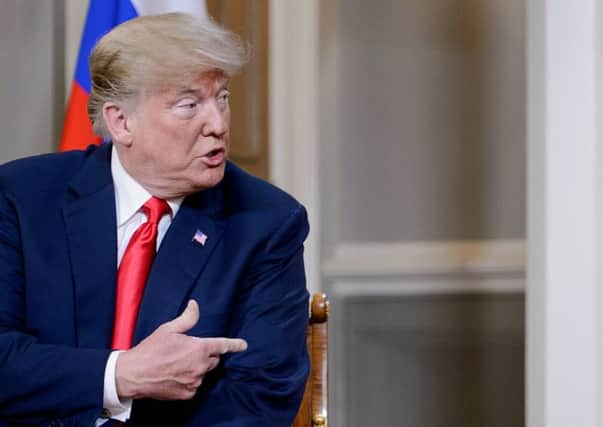Tom Peterkin: Trump's double-negative excuse doesn't not sound unconvincing


So that’s it sorted out then. Donald Trump seems to think so at least.
The US President has explained that when he sided with America’s Cold War enemy over his own intelligence services, he was doing nothing of the sort.
Advertisement
Hide AdAdvertisement
Hide AdAccording to Mr Trump, he simply “mis-spoke” when – in the full glare of the media – he dealt with allegations of Russian meddling in the US elections by taking the word of Vladimir Putin above that of his own security people.
Mr Trump’s refusal to endorse his own spy chiefs’ assessment that the Kremlin had interfered in the US democratic process and his acceptance of Mr Putin’s denial was – apparently – nothing more than a misunderstanding. Even by Mr Trump’s own lamentable standards this “explanation” of the terrible mess he got himself into during the Helsinki summit was remarkable in its comic clumsiness.
Mr Trump’s ham-fisted attempt to reverse ferret following his press conference with Mr Putin was a desperate effort to regain credibility as he faced furious claims of treason at home.
Displaying chutzpah of quite breath-taking proportions, he brushed off his inflammatory remarks with a tortured “clarification”. He claimed he had got the words “would and “wouldn’t” mixed up when he said he didn’t see any reason why it would be Russia that interferred in the election. Reading from a typed script, the President said what he should have said was “I don’t see any reason why it wouldn’t be Russia (who meddled in the election) – sort of a double negative”.
It was as clear as mud.
Imagine if Mr Trump’s “mis-speaking” excuse and typed verbal formula were copied by others in less exalted positions when they attempted to extricate themselves from tricky situations.
“I have reviewed an answer that I gave you this morning and I realise there is a need for some clarification,” a husband might say to his wife of an evening.
“It should have been obvious. I thought it would be obvious. But I would like to clarify just in case it was not.”
“What are you talking about, dear?”
“In a key sentence in my remarks this morning I said `would’ instead of `wouldn’t’. When I said I `would’ stay at home and help with the kids tonight what I meant was that I ‘wouldn’t’ and would be going to the pub after all.”
“But you promised...”
Advertisement
Hide AdAdvertisement
Hide Ad“Just to repeat it. I said the word `would’ instead of `wouldn’t’. I thought maybe what I said was perhaps a little unclear. The sentence should have been: ‘I don’t see any reason why I wouldn’t go to the pub’ – sort of a double negative. I think that probably clarifies things pretty good by itself.”
“No, it bloody well does not!” would be the entirely justifiable response of any self-respecting wife.
Just as an errant husband’s snivelling attempt to get out of domestic duties to go drinking would get short shrift, so will Mr Trump’s desperate back-tracking. Some have speculated that Mr Trump’s background in business and deal-making has produced a bombastic style which has proved so ill-suited to the complexities of international affairs. Amateur psychologists have theorised that Mr Trump prefers to hobnob with alpha males than get bogged down with the crucial diplomatic detail. Whatever the reason for his blind-spots, they are creating chaos. In the run-up to the Finnish fiasco, Mr Trump had run amok in the UK. He didn’t quite say that Theresa May’s Brexit deal had enough fudge to put Willy Wonka out of business, but he might as well have. His blunt assessment that Mrs May’s Brexit vision would probably kill off a trade deal with the US in a Sun newspaper interview totally overshadowed efforts to strengthen the special relationship.
Having prepared for the Helsinki Summit with a golfing regime that put Tiger Woods and Rory McIlroy to shame, more chaos was to ensue, leading to his garbled “clarification” from the White House on Tuesday.
Compounding Mr Trump’s problems is the fact that his back-tracking fails to undo the damage, because it is invariably half-hearted.
So it was that when Mr Trump said sorry to the Prime Minister for his remarks about Brexit. He appeared to apologise for the way the Sun interview was presented rather than what he actually said.
“When I saw her (Mrs May) this morning, I said, ‘I want to apologise, because I said such good things about you’,” were Mr Trump’s words. Similarly, when he dealt with the fallout from Helsinki, his declaration that he had “full faith” in his intelligence agencies left room for ambiguity.
His statement was supposed to be fulsome in its support of the US security agencies, but he was unable to resist qualifying it.
Advertisement
Hide AdAdvertisement
Hide Ad“Russia’s actions had no impact at all on the outcome of the election. I accept our intelligence community’s conclusion that Russia’s meddling in the 2016 election took place,” the President said, before adding: “Could have been other people also.”
The events of the last few days have added to the disturbing body of evidence that demonstrates Mr Trump has a gift for bringing discord where there are hopes of harmony.
This unhappy knack may provide a dose of entertaining political slapstick and the President’s opponents will take some heart from the damage to his credibility. But given the febrile state of international relations, the world deserves better.
